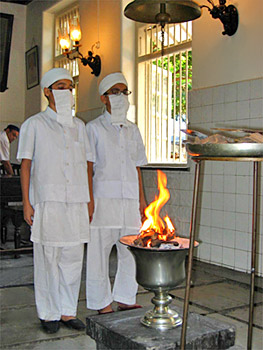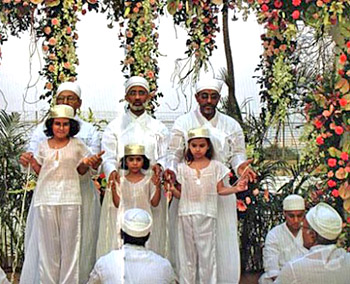Parsi customs are strictly followed by this community residing in India. However, there are no divisions among the Parsis with regard to caste and there are no restrictions regarding the intake of any special kind of food. They worship fire and consider it to be the most pure symbol of Divinity. They remain loyal to their Zoroastrian faith and boast of about their racial purity. Marriage of a Parsi to an outsider is very rare.
 They worship in fire temples. Fire is considered to be sacred by the Zoroastrians. Fire provides warmth, light and energy and thus creates life. In India, there are eight Atash Behrams or Victorious Fires. Four of them are in the city of Mumbai (Bombay) in Maharashtra, one of the states of India. Four Atash Behrams are there in the Gujarat state, of which two are in Surat and one each in Navsari and Udwada.
They worship in fire temples. Fire is considered to be sacred by the Zoroastrians. Fire provides warmth, light and energy and thus creates life. In India, there are eight Atash Behrams or Victorious Fires. Four of them are in the city of Mumbai (Bombay) in Maharashtra, one of the states of India. Four Atash Behrams are there in the Gujarat state, of which two are in Surat and one each in Navsari and Udwada.
There is a custom in the Parsi community that when a Parsi lady becomes pregnant she conducts various ceremonies alongwith her parents and in-laws. Several ceremonies are organised in the families of both the husband and wife. As per the custom of the Parsis, a woman is thought to be unclean for a period of forty days after the birth of the child, and in that period she is not even permitted to touch anything besides her own bed and the cradle of her child. The woman is bathed on the fortieth day and after undergoing purification she is permitted to touch other members of the family as before. Leaving the iron portion of the cot and cradle used by the woman and her child, everything else which has been used or touched by both the mother and child are thrown away or given to the sweeper.
The investiture of the child, whether a boy or a girl, with the `sudra` and `kusti`, takes place, as per the religious injunction, any time after it has reached the age of six years and three months, but not before that age. The wearing of the `jabhla` is then discontinued, and, as in case of adult, the `sudra` and `kusti` are worn instead.
 The boy or girl who has been initiated into the Zoroastrian religion is at once dressed in new and fine clothes, which are put on over the `sudra`. Relatives and friends then hasten to offer their gifts in dresses or money to the child and its parents. All the family members and the guests lastly take part in a sumptuous feast. The `sudra`, which is always worn next to the skin, is made of fine linen gauze or net, while the `kusti` is a thin woolen cord, or cincture of seventy two threads. These threads represent the seventy two `has` or chapters of the sacred book of the Parsis, called Yazashne. The `sudra` means `the garment of the good and beneficial way`. The `kusti` is passed round the waist three times and tied with four knots, two in front and two behind, during the chanting of a short hymn.
The boy or girl who has been initiated into the Zoroastrian religion is at once dressed in new and fine clothes, which are put on over the `sudra`. Relatives and friends then hasten to offer their gifts in dresses or money to the child and its parents. All the family members and the guests lastly take part in a sumptuous feast. The `sudra`, which is always worn next to the skin, is made of fine linen gauze or net, while the `kusti` is a thin woolen cord, or cincture of seventy two threads. These threads represent the seventy two `has` or chapters of the sacred book of the Parsis, called Yazashne. The `sudra` means `the garment of the good and beneficial way`. The `kusti` is passed round the waist three times and tied with four knots, two in front and two behind, during the chanting of a short hymn.
There is another custom among the Parsis which is followed by them in the death ceremonies. When a Parsi dies, body of the dead is wrapped in clean clothes and kept on an oblong piece of polished stone, which is laid on the floor. The female members and other relations of the family sit down together on a carpet spread in the room in which the body is placed, the men sitting on chairs or benches in the verandah. If someone dies at night then the body is kept in the house till the next morning, but in case someone dies in the day, the four or five hours before sunset the body is removed to its final resting place in the afternoon. Till the last funeral ceremony, a priest continues saying certain prayers before the corpse, burning sandal-wood over a fire all the time. When the time comes for the removal of the body, it is positioned upon an iron bier which is brought in by the corpse-bearers. Two priests then stand facing the corpse, and recite the seven `has` called `Ahunavaiti Gatha.`
Once the recital is complete, the dead body is taken out of the house on the bier, and carried on the shoulders of `nasesalars` or corpse-bearers to the `dokhma` or tower of silence, which is usually constructed in a solitary place and upon an eminence. After the dead body is taken away from the house, urine of cow is thrown as a disinfectant on the spot where it had lain, as well as on the way through which the corpse was taken out. Once the procession reaches the resting-place, the iron bier is put upon the ground, the face of the deceased is uncovered for a few minutes in order that a last look, and the whole assembly bow before it. After a few minutes the body is carried by the bearers into the `dokhma,` and the vultures which are ever ready in the nearby areas soon denude it of flesh. Thus, the customs of the Parsis are unique and they practice it religiously.




















